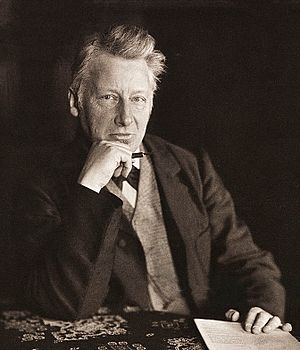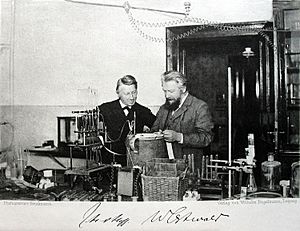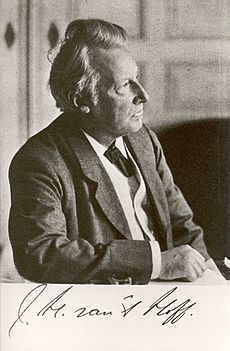Jacobus Henricus van 't Hoff facts for kids
Quick facts for kids
Jacobus Henricus van 't Hoff Jr.
|
|
|---|---|

Van 't Hoff by Nicola Perscheid in 1904
|
|
| Born | 30 August 1852 Rotterdam, Netherlands
|
| Died | 1 March 1911 (aged 58) Steglitz, Berlin, German Empire
|
| Nationality | Dutch |
| Alma mater | |
| Known for |
|
| Awards |
|
| Scientific career | |
| Fields | Physical chemistry Organic chemistry Theoretical chemistry |
| Institutions |
|
| Doctoral advisor | Eduard Mulder |
| Doctoral students | Ernst Cohen |
| Other notable students | Frederick G. Donnan |
Jacobus Henricus "Henry" van 't Hoff Jr. ( 30 August 1852 – 1 March 1911) was a Dutch physical chemist. A highly influential theoretical chemist of his time, van 't Hoff was the first winner of the Nobel Prize in Chemistry.
Jacobus helped to found the discipline of physical chemistry as we know it today, he is also considered to be one of the greatest chemists of all time.
Contents
Biography
Hoff was born in Rotterdam, Netherlands, 30 August 1852. His father was Jacobus Henricus van 't Hoff Sr., a physician, and his mother was Alida Kolff van 't Hoff. From a young age, he was interested in science and nature, and frequently took part in botanical excursions. In his early school years, he showed a strong interest in poetry and philosophy. He considered Lord Byron to be his idol.
Against the wishes of his father, van 't Hoff chose to study chemistry. First, he enrolled at Delft University of Technology in September 1869, and studied until 1871, when he passed his final exam on 8 July and obtained a degree of chemical technologist. He passed all his courses in two years, although the time assigned to study was three years. Then he enrolled at University of Leiden to study chemistry. He then studied in Bonn, Germany, with August Kekulé and in Paris with Adolphe Wurtz. He received his doctorate under Eduard Mulder at the University of Utrecht in 1874.
In 1878, van 't Hoff married Johanna Francina Mees. They had two daughters, Johanna Francina (1880–1964) and Aleida Jacoba (1882–1971), and two sons, Jacobus Henricus van 't Hoff III (1883–1943) and Govert Jacob (1889–1918). Van 't Hoff died at the age of 58, on 1 March 1911, at Steglitz, near Berlin, of tuberculosis.
Career
In 1887, he and German chemist Wilhelm Ostwald founded an influential scientific magazine named Zeitschrift für physikalische Chemie ("Journal of Physical Chemistry"). In 1896, he became a professor at the Prussian Academy of Sciences in Berlin. His studies of the salt deposits at Stassfurt were an important contribution to Prussia's chemical industry.

Van 't Hoff became a lecturer in chemistry and physics at the Veterinary College in Utrecht. He then worked as a professor of chemistry, mineralogy, and geology at the University of Amsterdam for almost 18 years before eventually becoming the chairman of the chemistry department. In 1896, van 't Hoff moved to Germany, where he finished his career at the University of Berlin in 1911. In 1901, he received the first Nobel Prize in Chemistry for his work with solutions.
His research on chemical kinetics, chemical equilibrium, osmotic pressure and crystallography are credited to be his major works.
Honours and awards
In 1885, van 't Hoff was appointed as a Member of the Royal Netherlands Academy of Arts and Sciences. In 1904, he was elected as a member to the American Philosophical Society. Other distinctions include honorary doctorates from Harvard and Yale (1901), Victoria University, the University of Manchester (1903), and University of Heidelberg (1908). He was awarded the Davy Medal of the Royal Society in 1893 (along with Le Bel), and elected a Foreign Member of the Royal Society (ForMemRS) in 1897. He was awarded the Helmholtz Medal of the Prussian Academy of Sciences (1911), and appointed Knight of the French Legion of Honour (1894) and Senator in the Kaiser-Wilhelm-Gesellschaft (1911). Van 't Hoff became an Honorary Member of the British Chemical Society in London, the Royal Netherlands Academy of Arts and Sciences (1892), American Chemical Society (1898), the Académie des Sciences in Paris (1905), and the Netherlands Chemical Society (1908). Of his numerous distinctions, van 't Hoff regarded winning the first Nobel Prize in Chemistry as the culmination of his career. The following are named after him:
- Van 't Hoff factor
- Van 't Hoff equation
- Le Bel–Van 't Hoff rule
On 14 May 2021, asteroid 34978 van 't Hoff, discovered by astronomers with the Palomar–Leiden survey in 1977, was named in his memory.
See also
 In Spanish: Jacobus Henricus van 't Hoff para niños
In Spanish: Jacobus Henricus van 't Hoff para niños


